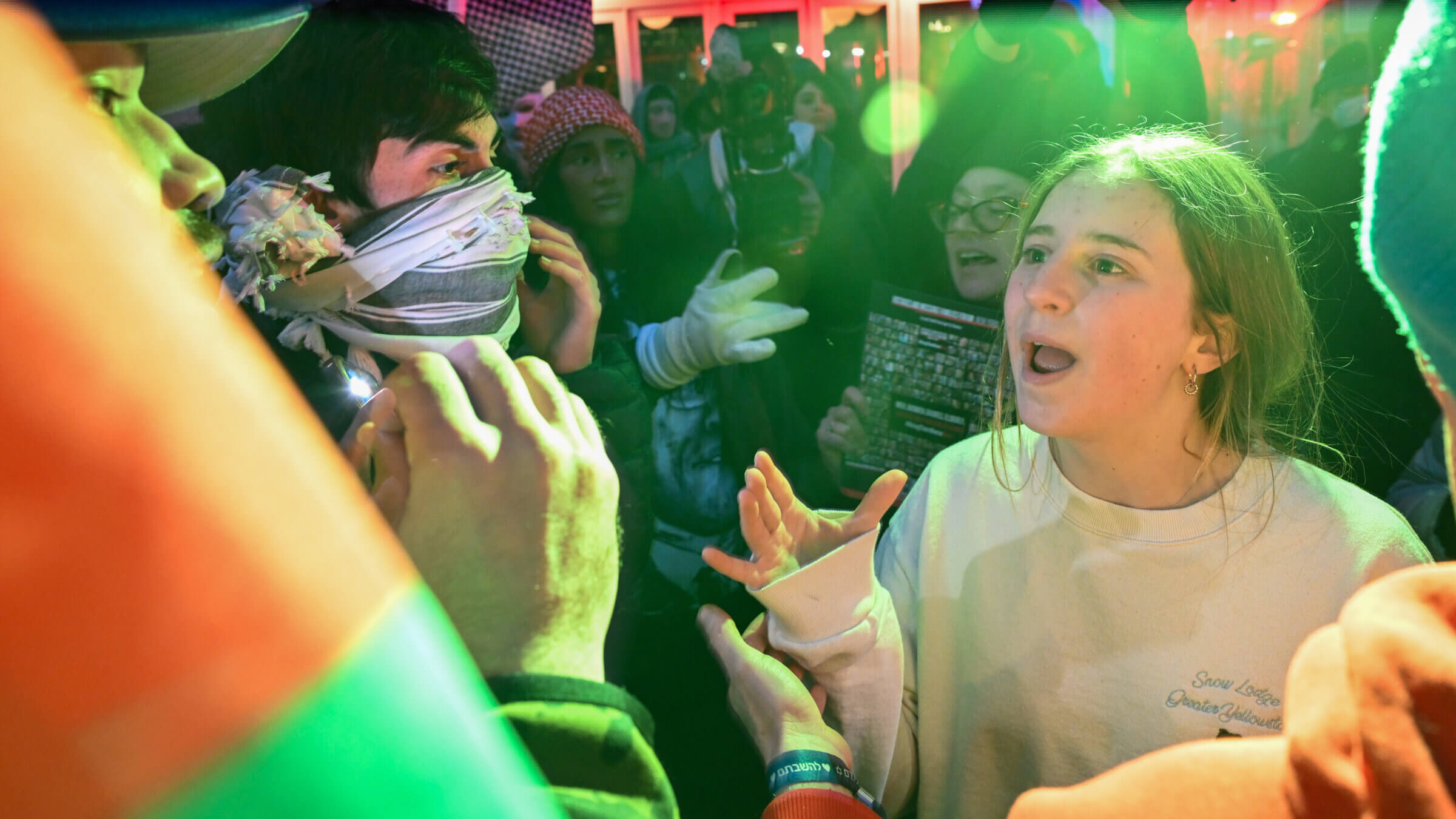Why the ADL is struggling to find its campus footing

Students and other protesters argue near Columbia University in February. The Anti-Defamation League’s new “report cards” for colleges and universities drew a rebuke from many Hillel leaders. Photo by Getty Images
“Antisemitism Notebook” is a weekly email newsletter from the Forward, sign-up here to receive the full newsletter in your inbox each Thursday
As fears over campus antisemitism escalated following Oct. 7, the Anti-Defamation League announced plans to get more involved in higher education, including by releasing “report cards” for dozens of colleges and universities.
But when the group released its first batch of grades last week — awarding only two “As” and “failing” some of the most prestigious schools in the country — it received a sharp rebuke from Hillel, the best-known group serving Jewish students on campus.
“We do not believe it is constructive or accurate to try to assign grades to schools,” said Adam Lehman, Hillel’s chief executive, who otherwise is usually a close partner of the ADL. “Efforts to do so, however well-intended, produce misleading impressions regarding the actual Jewish student experience at those schools.”
The tension over the report cards stems in part from the ADL’s apparent desire to transcend the existing models for combating antisemitism and criticism of Israel on campus:
- The insiders: Hillel and Chabad staff interact with tons of students and believe they know best how — and when — to work with school administrators over the course of many years.
- The big dogs: National organizations like the American Jewish Committee and powerful Jewish federations get involved on campus when problems flare, applying political pressure on university leaders and donors at key moments.
- The rabble rousers: Activist groups like StopAntisemitism.org take a more guerilla approach to amplify clashes on campus, generating public outrage via social media and, increasingly, hiring so-called “doxxing trucks” to beam the names and faces of pro-Palestinian students and professors across campus.
These different approaches can work in harmony, with outside groups splashing a campus incident across social media, creating a headache for administrators who may then be more willing to listen to the insiders.
But the separation is also key. Outsiders have more leeway to use hyperbole and controversial tactics, like doxxing anti-Israel activists, because they aren’t the ones actually meeting with university presidents.
Liora Rez, the pseudonymous social media influencer who runs StopAntisemitism, has been releasing campus “report cards” for years, without regard to their impact on her relationships with the schools. Which is fine, because her group’s raison d’être is to name and shame people it deems antisemites.
The insiders and their big-dog allies are not so cavalier. They save their political ammunition for bigger battles, like changing a school policy or forcing a dean to confront a problematic professor.
Two other recent insider efforts to assess campus antisemitism — an “antisemitic hostility index” created by Brandeis University and Hillel’s latest annual college guide — notably avoided ranking or grading schools.
But the ADL wants to play the inside and outside game at once. They’re offering educational resources to university administrators and writing letters asking them to investigate student clubs, while simultaneously naming and shaming many of those very schools. And Jonathan Greenblatt, its chief executive, was quoted in The Washington Post this week defending StopAntisemitism’s approach.
That may set the stage for future conflicts between the nation’s preeminent Jewish defense group and many of its historic allies.
Further reading:
- The ADL’s new ‘report card’ for campus antisemitism gets an F from Hillel and some Jewish students (JTA)
- They criticized Israel. This Twitter account upended their lives. (Washington Post)
- Chabad and the ADL have different approaches to Israel on campus. Will a new partnership change that? (Antisemitism Notebook)
A message from our CEO & publisher Rachel Fishman Feddersen
I hope you appreciated this article. Before you move on, I wanted to ask you to support the Forward’s award-winning journalism during our High Holiday Monthly Donor Drive.
If you’ve turned to the Forward in the past 12 months to better understand the world around you, we hope you will support us with a gift now. Your support has a direct impact, giving us the resources we need to report from Israel and around the U.S., across college campuses, and wherever there is news of importance to American Jews.
Make a monthly or one-time gift and support Jewish journalism throughout 5785. The first six months of your monthly gift will be matched for twice the investment in independent Jewish journalism.
— Rachel Fishman Feddersen, Publisher and CEO